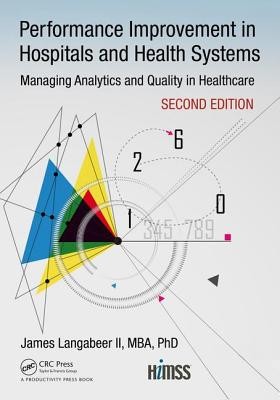
- We will send in 10–14 business days.
- Author: James R Langabeer
- Publisher: Productivity Press
- ISBN-10: 1138296406
- ISBN-13: 9781138296404
- Format: 17.8 x 25.4 x 1.4 cm, softcover
- Language: English
- SAVE -10% with code: EXTRA
Performance Improvement in Hospitals and Health Systems (e-book) (used book) | bookbook.eu
Reviews
Description
Healthcare Organizations offer significant opportunities for change and improvement in their overall performance. Hospitals and clinics are generally large, complex, and inefficient, and need serious development in process workflow and management systems, which will ultimately lead to better patient and financial outcomes. The National Academy of Medicine has stated that hospital systems are broken, and that they must begin by "... improving hospital efficiency and patient flow, and using operational management methods and information technologies." In fact, costs and quality are two of the important aspects of the "triple aim" in healthcare.
One area that offers significant potential for improvement is through the application of performance improvement methods to patient and process flows. Performance improvement has a significant impact on a hospital's over financial and strategic performance. Performance improvement involves the deployment of quantitative and scientific methods to model and influence the functioning of organizations. Performance improvement professionals are tasked with managing a variety of activities, such as deploying new information technologies, serving as project managers for construction events, re-engineering departmental process workflow, eliminating bottlenecks, and improving the flow and movement of patients between resource-intensive clinical areas. All of these are high risk, and require use of advanced, sophisticated methods to improve efficiency and quality, while minimizing disruptions from change.
This updated edition is a comprehensive and concise guide to performance improvement in healthcare. It describes the management engineering principles focused on designing optimal management and information systems and processes. Case studies and examples are integrated throughout all chapters.
EXTRA 10 % discount with code: EXTRA
The promotion ends in 21d.00:37:04
The discount code is valid when purchasing from 10 €. Discounts do not stack.
- Author: James R Langabeer
- Publisher: Productivity Press
- ISBN-10: 1138296406
- ISBN-13: 9781138296404
- Format: 17.8 x 25.4 x 1.4 cm, softcover
- Language: English English
Healthcare Organizations offer significant opportunities for change and improvement in their overall performance. Hospitals and clinics are generally large, complex, and inefficient, and need serious development in process workflow and management systems, which will ultimately lead to better patient and financial outcomes. The National Academy of Medicine has stated that hospital systems are broken, and that they must begin by "... improving hospital efficiency and patient flow, and using operational management methods and information technologies." In fact, costs and quality are two of the important aspects of the "triple aim" in healthcare.
One area that offers significant potential for improvement is through the application of performance improvement methods to patient and process flows. Performance improvement has a significant impact on a hospital's over financial and strategic performance. Performance improvement involves the deployment of quantitative and scientific methods to model and influence the functioning of organizations. Performance improvement professionals are tasked with managing a variety of activities, such as deploying new information technologies, serving as project managers for construction events, re-engineering departmental process workflow, eliminating bottlenecks, and improving the flow and movement of patients between resource-intensive clinical areas. All of these are high risk, and require use of advanced, sophisticated methods to improve efficiency and quality, while minimizing disruptions from change.
This updated edition is a comprehensive and concise guide to performance improvement in healthcare. It describes the management engineering principles focused on designing optimal management and information systems and processes. Case studies and examples are integrated throughout all chapters.


Reviews